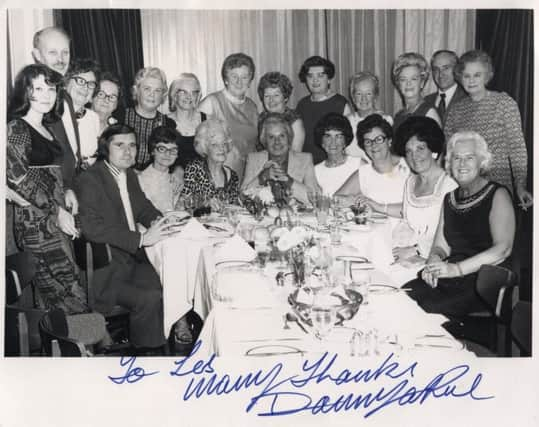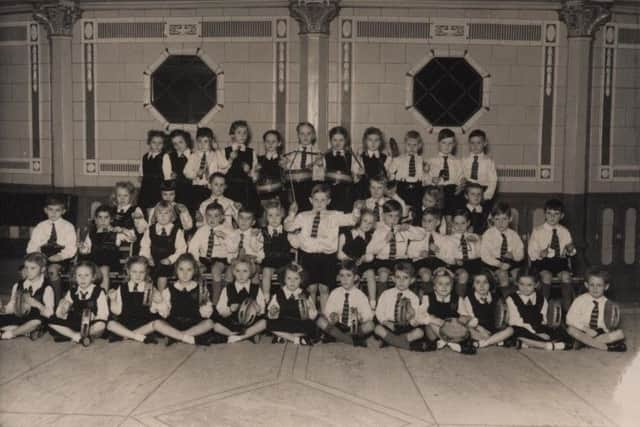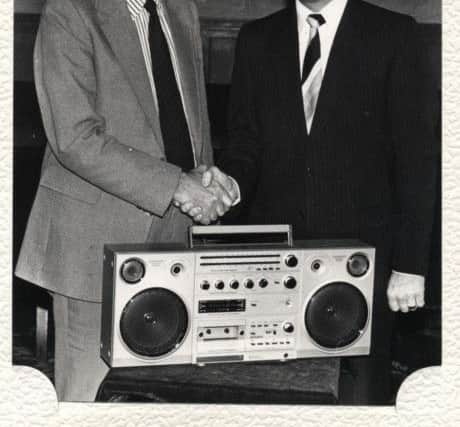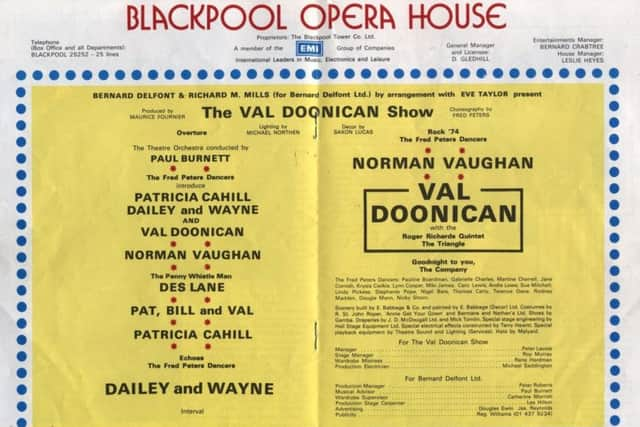Memories from the front line of 50s theatre


In summer, the resort was packed with stars and dancers. You could hardly miss them. They were in the Savoy Cafe having coffee. They were in RHO Hills and Boots, buying make-up, perfumes and the new long-playing records. They were coming out of the Vernon Humpage shoe shop and the WH Orry fashions shop, clutching large carrier bags.
The men always seemed dressed for golf and some had cars we had only seen in American magazines like the Saturday Evening Post.
Advertisement
Hide AdAdvertisement
Hide AdThe girls, dozens of dazzling dancers, seemed to be six feet tall.


Sunbathers on the North Pier and on the terrace at the old Derby Baths often found themselves next to a couple if these ‘fit’ girls.
Ah, such sweet nostalgia, shared by many lads about town.
Nowhere had more stars and glamour than the Winter Gardens because two of George and Alfred Black’s summer shows were there for four months.
The resort’s number one show was in the Opera House, while the Pavilion housed a slightly less starry show.


Advertisement
Hide AdAdvertisement
Hide AdThe contrast between the two theatres was stark. The Opera House, built in 1939, was luxurious and spacious. The Pavilion, built in 1878 and subject to many alterations, was showing its age. On a windy night a cold draught would travel up the Floral Hall and dip into the recessed stalls area. Result – cold feet!
The dressing rooms were reached by a narrow, spiral brick staircase. They became very hot in summer.
The Pavilion was unpopular with artists. When Brian Rix brought his first hit, Reluctant Heroes, for a week in 1950, he experienced the Pavilion’s shortcomings, both as actor and manager.
Decades later, in one of his autobiographies, he trashed the place!


Advertisement
Hide AdAdvertisement
Hide AdReaders who were old enough to be out late will remember the days when the Gardens was the centre of Blackpool’s night-life, when the building was heaving with theatre-goers and dancers and it could take 20 minutes get your coat out of the cloakroom at the end of the evening. Everyone had a coat in those days.
Younger readers may be amazed to hear the Winter Gardens would cater for about 11,000 people on busy summer evenings.
That figure is confirmed by Leslie Heyes, who was house manager for 10 years.
“The Opera House had a summer show of up to 18 weeks with two houses, accommodating a total of 6,000 on busy nights and two performances at the Pavilion adding 3,000. At the same time, we could have more than 2,000 in the Empress Ballroom,” he said.


Advertisement
Hide AdAdvertisement
Hide Ad“Getting audiences in and out was a major job, particularly when Ken Dodd was over-running. We had 15 minutes to get the first house audiences out and the second houses in at the two theatres.”
Les’s staff of 20 usherettes handled it.
All those patrons had bought tickets, whether for a show or for the ballroom. The ticket sales were handled by 30 cashiers working in shifts in four box offices. There was also a postal booking office.
Those 50 staff members came under Les’s direction, as well as 15 buildings attendants.
Les himself reported directly to Donald Gledhill, general manager of the Tower Company, owners of the Winter Gardens.
Advertisement
Hide AdAdvertisement
Hide AdLes, who is 75 and lives at Starr Gate, first set foot in the Winter Gardens when he was only six, as a member of the Hawes Side School percussion band, competing in the 1947 Blackpool Musical Festival. They won their class.


He started work at the Gardens in 1956, in a temporary Easter holiday job in the cash control office. He made an impression and was asked if he wanted to stay.
There was a snag. He was still at school!
He went to see Mr Ford, the head of Highfield School, and explained the situation.
“I wasn’t due to leave until July, but he allowed me to leave immediately and take the job,” he said.
Advertisement
Hide AdAdvertisement
Hide AdLes became chief cashier of the Gardens complex in 1968 when he was 27 and two years later was promoted to assistant house manager. In 1972 he became house manager.
The job, although not involving stage work, brought him into contact with the stars of the summer shows and Sunday concerts. The nicest guys of all were Val Doonican and Danny La Rue, he says.
He left the Tower Company in 1982 to take a similar job at the Pleasure Beach and retired 11 years ago.
But he is still in touch with the entertainment business through his daughter, Janice Heyes, who is a stage manager with the National Theatre in London.
Advertisement
Hide AdAdvertisement
Hide AdIn the next few weeks, this page will recall the shows and the stars of the 1950s and 60s, beginning with photos and stories of famous concert stars like Frank Sinatra and Marlene Dietrich.
Then we will list the summer shows of those two decades at the Opera House and the Winter Gardens Pavilion.
Blackpool and Fylde folk have many memories of great times at the Gardens and we’d like to hear them for Memory Lane. Don’t be shy! Send them to Emma Harris: The Gazette, Avroe House, Avroe Crescent, Blackpool, FY4 2DP or email [email protected]